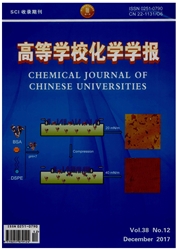

 中文摘要:
中文摘要:
从理论和实验两方面探讨稀土金属掺杂对锐钛矿型TiO2光催化活性的影响.理论上采用基于密度泛函理论(DFT)的第一性原理,对稀土掺杂TiO2前后的几何结构、能带结构、态密度及电子结构进行了系统的研究.结果表明,Y,La,Gd,Lu,Ce,Eu,Yb和Tb掺杂有助于TiO2光催化活性的提高;而对于Pr,Nd,Pm,Sm,Dy,Ho,Er和Tm掺杂,由于在价带顶和导带底之间形成了较多的可能成为光生电子和空穴的复合中心的杂质能级,故此类稀土的掺杂浓度需要控制在较小的范围内.另一方面,采用溶胶-凝胶法制备了9种稀土金属(RE=Y,Ce,Pr,Sm,Gd,Dy,Ho,Er,Yb)掺杂的TiO2粉体,运用X射线衍射(XRD)和紫外-可见光谱法(UV-Vis)分别表征其晶体结构和光学吸收性质.结果表明,掺杂前后的TiO2均为锐钛矿相,且Ho,Pr,Ce,Sm,Y,Yb和Gd掺杂使TiO2在可见光区的吸收有不同程度的提高.理论预测与实验结果基本一致,且理论研究结果与周期表中稀土元素外层电子轨道排布规律一致,从而揭示了稀土元素掺杂的本质规律,指明了适量的稀土掺杂有利于TiO2光催化活性的提高.
 英文摘要:
英文摘要:
The photocatalytic potential of rare earth doped TiO2(RE/TiO2) was studied by theoretical and experimental methods.With density functional theory(DFT),the geometries,band structures,density of states and electronic structures of RE/TiO2 with 16 TiO2 units in one supercell were calculated at plane wave ultra-soft pseudo-potential level with the exchange and correlation energy of the electrons described as generalized gradient approximation(GGA) of Perdew,Burke and Enzerhof(PBE).The results show that Y,La,Gd,Lu,Ce,Eu,Yb and Tb can promote the photocatalytic activity of TiO2,while too much of Pr,Nd,Pm,Sm,Dy,Ho,Er and Tm may decrease its photocatalytic activity by forming more orbitals between valence band top and conduction band bottom,which will act as combining centers for electronics and holes.On the other hand,the nine powders of Y,Ce,Pr,Sm,Gd,Dy,Ho,Er or Yb doped TiO2 were prepared by sol-gel method,and their crystal structures and optical absorption properties were characterized by X-ray diffraction(XRD) and UV-Vis spectrum,respectively.It shows that RE/TiO2 maintains the same crystal form as anatase TiO2,and the doping of Ho,Pr,Ce,Sm,Y,Yb and Gd can enhance its visible light absorption ability.In conclusion,the theoretical results agree with the experimental results and coincide with the external electronic orbital arrangement laws of rare earth elements in the periodic table,i.e.,more f electrons give more impurity energy levels between valence band top and conduction band bottom.It is clear that RE/TiO2 is more powerful than pure TiO2 and should possess higher photocatalytic activity than pure TiO2.
 同期刊论文项目
同期刊论文项目
 同项目期刊论文
同项目期刊论文
 Preparation and Photocatalytic Activities of Visible-light-driven TiO2 films codoped with Aluminum a
Preparation and Photocatalytic Activities of Visible-light-driven TiO2 films codoped with Aluminum a Palladium-based Catalyst without Interlayer Film Prepared by Electroless Plating for Catalytic Combu
Palladium-based Catalyst without Interlayer Film Prepared by Electroless Plating for Catalytic Combu Preparation, Characterization and Drug Release Properties of PEG-DA-based Copolymer Hydrogel Microsp
Preparation, Characterization and Drug Release Properties of PEG-DA-based Copolymer Hydrogel Microsp Density Functional Theory Calculations of arsenic(V) Structures on Perfect TiO2 Anatase (1 0 1) Surf
Density Functional Theory Calculations of arsenic(V) Structures on Perfect TiO2 Anatase (1 0 1) Surf 期刊信息
期刊信息
